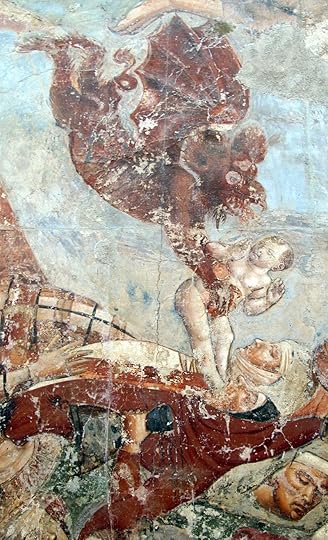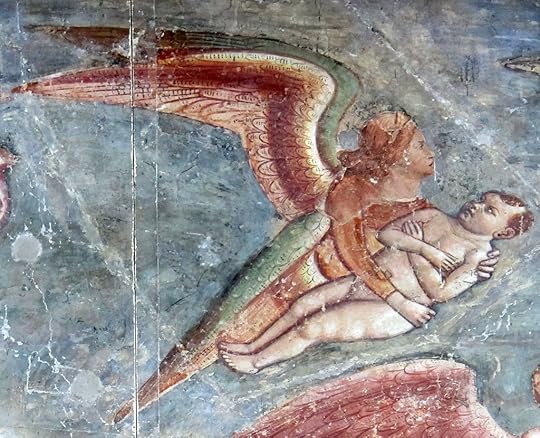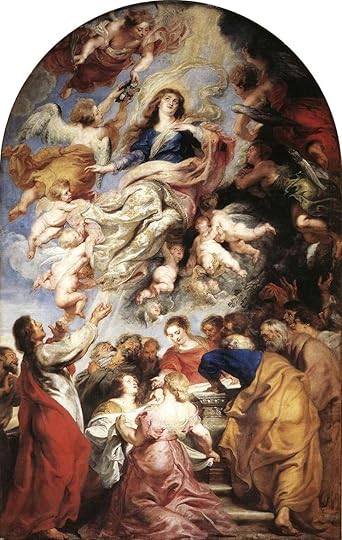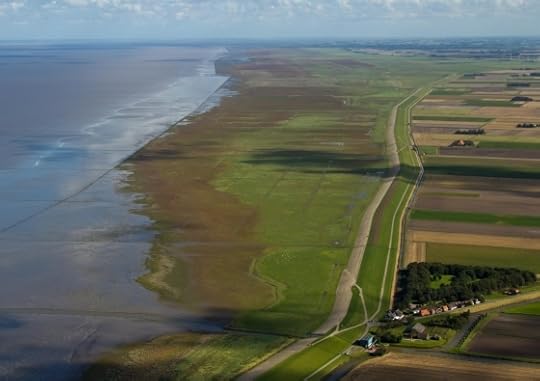Classics and the Western Canon discussion
Goethe, Faust
>
Faust Week 8 - Part 2 Act 5 and work as a whole
date newest »
newest »
 newest »
newest »
message 1:
by
Everyman
(new)
Sep 15, 2015 07:38PM
 This is the thread for the discussion of Act 5 and of the work as a whole.
This is the thread for the discussion of Act 5 and of the work as a whole.
reply
|
flag
 There is a lot going on in Act 5, the moral of which I believe is "Aye- every moment stay unsatisfied." Optimistic, right?
There is a lot going on in Act 5, the moral of which I believe is "Aye- every moment stay unsatisfied." Optimistic, right?My liberal interpretation follows; In one of Faust's earlier monologues he says "Am I a god? I feel such light in me!" It is the quest for this godlike/creative/feminine light that motivates Faust's endeavors. Okay, so he behaved appallingly with Gretchen. But he was trying, kind of. Gretchen was a pure soul over whom Mephisto was concerned he may hold no power. She also represented the earthly lustings Faust had yet to experience. And it is necessary to experience both good and evil to be like god.
So Faust has some experience and it goes badly, he doesn't even behave well afterward. We can hardly say he learned from the experience. But this brush with sin is necessary. Without it, Faust would never know if these experiences hold the divine/feminine/creative light for which he is striving.
Part 2 opened and we plunged into a world of mythical allegory and spectacle. I'll admit I was more than a little lost. But I'm okay with that. The experience isn't necessary for me. It *is* necessary for Faust. as the director reminds is in the prelude to the theater "To do a proper job you choose the tool that is adapted to your timber." After spending years in academia, the mythical figures are the tools which Faust (and perhaps Goethe) is most equipped to use on his personal journey. Faust is still pursuing the divine feminine in Helen, yet he makes mistakes along the way.
The Lord knew this would happen. After all, "Man ever errs as he strives." Actually, the Lord made sure that Faust would have plenty of opportunities to err in the company of mischievous Mephisto. (Note the irony in the end when Mephisto describes himself as Job-like and covered in boils. Here I thought Faust was our Job!)
Remember, Faust is trying to connect with that which is godlike and feminine in himself. (He first glimpses the woman in the witch's mirror- a reflection of himself- before he imbibes any of her potion.) By the end he wants to create a city that evolved from a watery place. This might sound confusing, but he's still using experience to strive for the divine creation. But he's making mistakes.
As old, blind, Faust hears the clinking of spades that dig his grave, he interprets the noise as the creation of his planned city. The realization of that for which he has continued to strive.
Ultimately, Faust errs while he strives, but continues to search for the divine feminine nevertheless. That's right, friends, every moment stay unsatisfied.
 First scenes: Faust’s blindness and death.
First scenes: Faust’s blindness and death. Surprise, Faust journey brings him right to my doorstep! This land won on the sea happens to be my turf. (view spoiler)
The act opens with an inversion of the Philemon & Baucis myth. After long years Faust’s 'neptunic' enterprise has yielded impressive results. From their cottage on a little hill Philemon & Baucis reflect on it, reaching opposing conclusions. And both are right: such are the dilemma’s of modern technology and economics.
In the meantime Faust suffers in his palace, not far away. He can have no peace as long as he is not in possession of the old couples little hilltop. And so Meph is able to implicate him in a hideous crime. Faust is accosted by Care, but arguing that he is a man of action, he closes his conscience to her.
In retaliation Care strikes him with blindness. And not only his eyes, also his mental vision is blurred, though Faust believes his is now guided by an inner light (!), and ready for even greater projects:
Deep night now seems to fall more deeply still,
Yet inside me there shines a brilliant light;
What I have thought, I hasten to fulfill:
The masters word alone has real might.
Up from your straw, my servants! Every man!
…
To make the grandest dream come true,
One mind for thousand hands will do.
Faust stumbles into the courtyard to address his workforce, and is happy to hear the spades cling. In fact only Meph and his grave diggers are present, mocking Faust’s last words:
This is the highest wisdom that I own,
The best that mankind ever knew:
Freedom and life are earned by those alone
Who conquer them each day anew.
Surrounded by such danger, each one thrives,
Childhood, manhood, and age lead active lives.
At such a throng I would fain stare,
With free men on free ground their freedom share.
Then, to the moment I might say:
Abide, you are so fair!
The traces of my earthly day
No aeons can impair.
As I presage a happiness so high,
I now enjoy the highest moment.
At last Faust has reached his destination and dies. Meph's sensual delights nor art & literature could satisfy Faust, nor even his grandiose reclamation project. But a vision of how that work might be used for the common good fills his inner emptiness. An ideal. Free people, living an uncertain life, but masters on their own ground. Yeoman ideology.
It’s an old concept that freedom and democracy flourish where a collective defense against the sea is a necessity. But comparable circumstances, the collective organization of great irrigation schemes, are also offered to explain ancient slave-empires. Now Faust, who used rather dictatorial methods, seems in his last moments to be switching paradigm.
What makes him change his mind? That remains a problem and it disturbs me. But the blind man and his vision are magnificent. They are also very familiar.
Translations: Kaufmann
 Middle scene - Faust's soul
Middle scene - Faust's soulMeph’s reaction on Faust’s death shows that the Devil is opposing not just this or that, but all of creation. Even sin - the Stones sympathy seems quite misplaced.
Over and pure nothing, it is all the same.
Why have eternally creation,
When all is subject to annihilation?
Now it is over. What meaning can one see?
It is as if it had not come to be,
And yet it circulates as if it were.
I should prefer - Eternal Emptiness.
Anyway, now Faust died in a state of bliss (!), Meph thinks he has won his bet and prepares to collect our hero's soul.

Devil capturing a soul escaping from body - Detail from the fresco Trionfo della morte, Camposanto, Pisa, ascribed to Buffalmacco
But the angels intervene and one more hilarious scene follows in which Meph, distracted by the shapely angels asses, loses his prize and almost ends up saved himself. Meanwhile critics discuss the question who, by right, won the bet. They may fight the case for many more years, but it will not change the outcome.

Angel carrying away a soul snatched from the devil - Detail from the fresco Trionfo della morte, Camposanto, Pisa, ascribed to Buffalmacco
Translation: Kaufmann - Images: Wikimedia
 Ashley & Wendel. Great comments and the images really added to the completion of Faust. I had a hard time through Part two as my book only had portions of it and I had to go on line to read the omitted sections, which were quite long at times. I was easily distracted. I REALLY don't like reading more than a length of a news item on line!!
Ashley & Wendel. Great comments and the images really added to the completion of Faust. I had a hard time through Part two as my book only had portions of it and I had to go on line to read the omitted sections, which were quite long at times. I was easily distracted. I REALLY don't like reading more than a length of a news item on line!!
 Final scene - Faust’s ascension
Final scene - Faust’s ascensionWe are now in a world very different from the misty seashore we just left - in fact it is different from any place we know. Holy Anchorites rejoice in wild nature, mirroring a mystic world still outside our view. Nature is a parable says Goethe. And this is how he describes her phenomena:
Sind Liebesboten, sie verkünden,
Was ewig schaffend uns umwallt.
Mein Innres mög es auch entzünden,
Wo sich der Geist, verworren, kalt,
Verquält in stumpfer Sinne Schranken,
Scharfangeschlossnem Kettenschmerz.
O Gott, beschwichtige die Gedanken,
Erleuchte mein bedürftig Herz!
They are love’s heralds and proclaim
What is creative everywhere.
That they would make my insides flame
Where now my spirit dwells in care,
In fetters that dull senses wrought,
Confused and cold, in bitter smart.
O God! relieve all anguished thought,
Illumine Thou my needy heart!
This rough beauty is a fearsome sight for the unexperienced stillborn souls - so we move on, always upwards. This mystic sphere is the place where love reigns. We find many variations on the theme: Ewiger Liebe Kern (Love’s everlasting core), die allmächtige Liebe, Die alles bildet, alles hegt (almighty love, By which all things are nursed and fashioned), Ewigen Liebens Offenbarung, Die zur Seligkeit entfaltet (Timeless loving is revealed, That unfolds beatitude).
The scene is clearly related to the finale of the Divina Commedia, soon Gretchen will take Beatrice’s place as intermediary. Of course, while Dante’s world is thoroughly Christian, Goethe’s catholic images must be figurative. But are the emotions so very different? Or is Goethe only creating an elegant finale to his story?
Three women pray that love may lead to forgiveness. The angels exlaim "Wer immer strebend sich bemüht, Den können wir erlösen." ("Who ever strives with all his power, We are allowed to save."), as was promised in the Prologue. But it can’t be done without love. Then the Mater Gloriosa arrives, her appearance composed as a traditional Baroque painting depicting the Assumption of Mary:

This one is by Rubens, 1625, Antwerp Cathedral - the praying women are in the foreground, and as befits a Baroque painting it is very dynamic, showing a strong vertical movement, Maria’s eyes are already directed upwards, while in another variants her gaze is still on the worshippers at her feet, she too is an intermediary.
While none can be saved without love, love is also the female principle to which male creativity is directed. The aim of everything we've read about. This play was about masculine ambitions, it is a masculine reality, but here at the end Goethe tells us that the ideal is feminine. And so we reach the famous final lines:
Alles Vergängliche
Ist nur ein Gleichnis;
Das Unzulängliche,
Hier wird’s Ereignis;
Das Unbeschreibliche,
Hier ist’s getan;
Das Ewig-Weibliche
Zieht uns hinan.
What is destructible
Is but a parable;
What fails ineluctably,
The undeclarable,
Here it was seen,
Here it was action;
The Eternal-Feminine
Lures to perfection.
 what is the overall impression and how it fits together? I see it mentioned as a poem in several places and that makes more sense to me as I find it very hard to visualise as a production.
what is the overall impression and how it fits together? I see it mentioned as a poem in several places and that makes more sense to me as I find it very hard to visualise as a production.
 Cliff notes talked about the interpretation of the last scene that Faust finally found satisfaction and contentment in and through the act of trying to serve others for others sake and not his own. I was curios what others thought of this interpretation? I don't remember seeing any allusions or foreshadowing of this theme through out the play up to that point. It seemed to jump out of no where. Maybe I just missed something?
Cliff notes talked about the interpretation of the last scene that Faust finally found satisfaction and contentment in and through the act of trying to serve others for others sake and not his own. I was curios what others thought of this interpretation? I don't remember seeing any allusions or foreshadowing of this theme through out the play up to that point. It seemed to jump out of no where. Maybe I just missed something?
 Jeremy C. wrote: "Cliff notes talked about the interpretation of the last scene that Faust finally found satisfaction and contentment in and through the act of trying to serve others for others sake and not his own...."
Jeremy C. wrote: "Cliff notes talked about the interpretation of the last scene that Faust finally found satisfaction and contentment in and through the act of trying to serve others for others sake and not his own...."Have another look at Faust’s last speech, especially the lines quoted in my post @3 in this thread. But indeed, it is mentioned almost in passing - if that is a possible in 'famous last words'. And there is room for differing interpretations. What I see it as an expression of free farmer ideology, former East Germany used as proof that Goethe foresaw and welcomed the coming of Communism.
The ideal of a free man working his own soil is appealing (though inherently conservative), but I find it difficult to image that Goethe really shared it. As a high civil servant he was both aristocratic and servile, and he never worked a day with his hands. But then, he was after all a Romantic.
But maybe the exact nature of Faust's final ideal does not matter much, maybe Faust is really about the lack, the impossibility, of a fixed object in life. That would be a much more revolutionary and more modern (though less attractive, I fear) thought. Once 'Faustian', one can hardly stop being so.
 Faust is not happy with his land reclamation project until he has "perfected" it by evicting sweet old Philemon and Baucis, who of course perish as a result. His romantic vision of the peasant toiling in freedom is, I think, rather tainted by this act of violence. Freedom is indeed an act of "conquering," but on the political level it is almost always someone else who must pay the price for freedom. I get the feeling at the end that Faust never pays that price -- he sticks Mephistopheles with the bill, which I find both dissatisfying and funny.
Faust is not happy with his land reclamation project until he has "perfected" it by evicting sweet old Philemon and Baucis, who of course perish as a result. His romantic vision of the peasant toiling in freedom is, I think, rather tainted by this act of violence. Freedom is indeed an act of "conquering," but on the political level it is almost always someone else who must pay the price for freedom. I get the feeling at the end that Faust never pays that price -- he sticks Mephistopheles with the bill, which I find both dissatisfying and funny.



